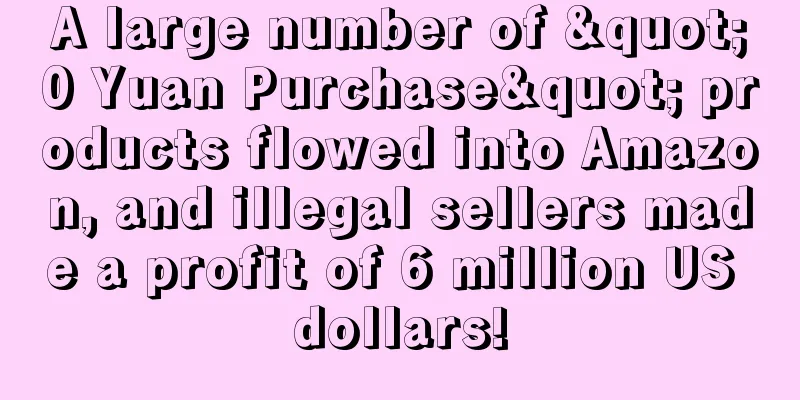A large number of "0 Yuan Purchase" products flowed into Amazon, and illegal sellers made a profit of 6 million US dollars!

|
In the past year, several major robberies occurred at Louis Vuitton stores in Union Square in San Francisco and the nearby Nordstrom , involving more than 80 robbers .
These robbers sold the stolen goods on e-commerce websites at lower prices, causing serious losses to offline retail stores and seriously disrupting the market order of e-commerce platforms.
The continued economic downturn and the impact of inflation have made "zero-dollar purchases" more and more frequent in Europe and the United States. These products are sold at ultra-low prices on major e-commerce platforms. The continuous "zero-dollar purchases" have had a serious impact on sellers who normally sell goods. Many sellers complained that the traffic of their stores has declined and sales have dropped .
An Altamonte man sold more than $ 6 million in stolen goods at Amazon, Walmart and Sears this month , and in the largest retail crime bust in California history , law enforcement seized $ 8 million in stolen goods.
Selling stolen goods is easy on Facebook Marketplace . Although it violates platform policies , Meta generally does not need to provide proof of identity or provide the basic name and verifiable email or phone number required to open a Facebook account .
An Ohio man said he was making $2,500 a day by selling stolen electric bikes on Facebook Marketplace for half the price and then trading them with customers in parking lots.
Online retailers have long differentiated themselves from traditional offline retail stores by claiming that they are not responsible for the quality and safety of products sold by third-party sellers , thereby facilitating robbery crimes on another level.
In order to eliminate such criminal cases, in December last year , 20 major retailers including Home Depot , Best Buy , Walgreens and Kroger wrote to Congress , asking online platforms to conduct stricter verification of sellers.
The House of Representatives passed a bill called the INFORM Consumers Act that would require some sellers on sites like Amazon, eBay and Facebook Marketplace to provide verifiable bank accounts, tax IDs , work emails and phone numbers.
Amazon, eBay and Facebook said they already have various protections in place to keep stolen goods from reaching their sites.
eBay relies primarily on a program called PROACT , which alerts retailers if a major theft occurs and then verifies whether the stolen merchandise is being sold on its site. eBay has spent millions of dollars on staff and back-end technology to run the program .
Amazon said in a statement: "Amazon does not allow third-party sellers to sell stolen goods on the site , and we work closely with law enforcement, retailers, and brands to stop bad actors and hold them accountable when such behavior occurs, including by withholding funds, terminating accounts , and making law enforcement referrals . "
The judicial department’s crackdown on robbery crimes is far from enough. Major e-commerce platforms should conduct stricter supervision on third-party sellers, strengthen identity verification and review of sellers , and maintain market order. 0 yuan purchase Amazon Platform |
Recommend
What is Aiyino? Aiyino Review, Features
Aiyino mainly deals in fashionable men's cloth...
Get ready for Christmas! Target releases the 2021 US best-selling toys list
Since 2020, sales in the US toy market have been ...
As Black Friday approaches, SHEIN devotes resources to support cross-border sellers to enter the "Million Dollar Club"
The intensity of this year's "Black Frid...
What is Cash App Pay? Cash App Pay Review, Features
Cash App Pay is the number one e-wallet in the Ph...
What is Kaitai International? Kaitai International Review, Features
Shenzhen Kaitai International Freight Forwarding C...
What is Drizly? Drizly Review, Features
Founded in 2012 and headquartered in Boston, Driz...
Another Shenzhen cargo ship had an accident, with 70 containers floating on the sea!
Another shipwreck. Problems frequently occur duri...
Cross-border e-commerce trade fair closed in Fuzhou; Alibaba's digital export port opened in Fujian industrial belt
Figure : At the cross-border e-commerce trade fai...
A popular Amazon warehouse is closed! The delivery of goods may be delayed
Recently, some freight forwarders and logistics c...
What is GPAY? GPAY Review, Features
GPAY is a cross-border mobile payment solution pro...
The first batch of foreign trade factories that joined AliExpress’s full-management service began to receive a surge in orders
In 2023 , with the changes in the global consumpt...
What is teasource? teasource Review, Features
TeaSource is the Twin Cities' foremost tea imp...
Etsy helps sellers boost sales on Valentine's Day! These products are expected to be a big hit
Valentine's Day is getting closer and closer,...
What is Selling Manager? Selling Manager Review, Features
Selling Manager is a free tool designed to help m...
What is Tarad? Tarad Review, Features
Tarad is a Thai online shopping website that also...









